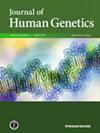Bi-allelic KCTD19 variants associated with meiotic arrest and non-obstructive azoospermia in humans
IF 2.5
3区 生物学
Q2 GENETICS & HEREDITY
引用次数: 0
Abstract
Non-obstructive azoospermia (NOA) represents the severe form of male infertility, affecting approximately 1% of men during their reproductive years. It is marked by the absence of sperm production caused by testicular dysfunction and has many genetic origins. However, the genetic factors underlying most NOA cases are still unclear. Meiosis, a crucial process ensuring accurate chromosome segregation and generating genetic diversity in gametes, is susceptible to genetic disruptions that may result in NOA. In this study, whole exome sequencing (WES) was conducted on 969 NOA patients, identifying six compound heterozygous KCTD19 variants in three Chinese pedigrees. KCTD19 has been demonstrated to interact with ZFP541 and HDAC1, thereby participating in the modulation of chromatin remodeling and transcriptional programs during meiosis in mice. Herein, our findings expand the phenotypic and mutational spectrum of KCTD19 in male infertility and provide further insights into its role during meiosis. This research underscores the importance of KCTD19 in meiotic progression and male fertility, highlighting the need for further investigation into the molecular mechanisms underlying gametogenic failure in NOA.

与人类减数分裂停止和非阻塞性无精子症相关的双等位基因KCTD19变异。
非阻塞性无精子症(NOA)是男性不育症的一种严重形式,影响约1%的育龄男性。它的特点是由于睾丸功能障碍导致精子产生不足,并且有许多遗传起源。然而,大多数NOA病例的遗传因素仍不清楚。减数分裂是确保染色体准确分离和在配子中产生遗传多样性的关键过程,容易受到可能导致NOA的遗传破坏。本研究对969例NOA患者进行了全外显子组测序(WES),在3个中国家系中鉴定出6个复合杂合KCTD19变异体。KCTD19已被证明与ZFP541和HDAC1相互作用,从而参与小鼠减数分裂期间染色质重塑和转录程序的调节。本研究扩大了KCTD19在男性不育症中的表型和突变谱,并为其在减数分裂中的作用提供了进一步的见解。这项研究强调了KCTD19在减数分裂过程和男性生育能力中的重要性,强调了进一步研究NOA配子发生失败的分子机制的必要性。
本文章由计算机程序翻译,如有差异,请以英文原文为准。
求助全文
约1分钟内获得全文
求助全文
来源期刊

Journal of Human Genetics
生物-遗传学
CiteScore
7.20
自引率
0.00%
发文量
101
审稿时长
4-8 weeks
期刊介绍:
The Journal of Human Genetics is an international journal publishing articles on human genetics, including medical genetics and human genome analysis. It covers all aspects of human genetics, including molecular genetics, clinical genetics, behavioral genetics, immunogenetics, pharmacogenomics, population genetics, functional genomics, epigenetics, genetic counseling and gene therapy.
Articles on the following areas are especially welcome: genetic factors of monogenic and complex disorders, genome-wide association studies, genetic epidemiology, cancer genetics, personal genomics, genotype-phenotype relationships and genome diversity.
 求助内容:
求助内容: 应助结果提醒方式:
应助结果提醒方式:


